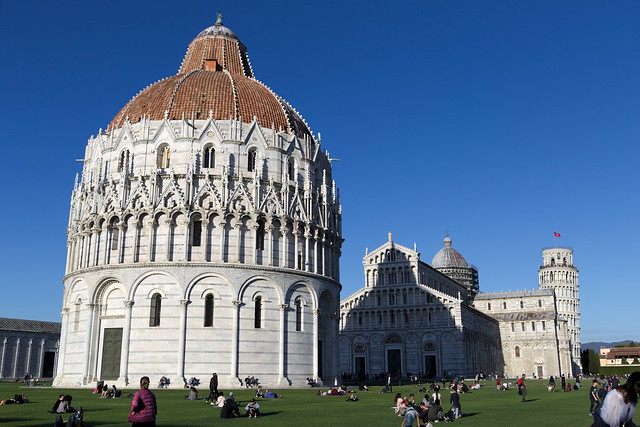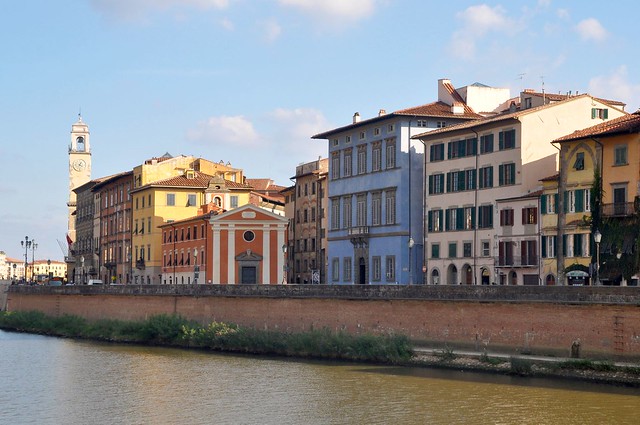The world famous tower of Pisa is a massive attraction for tourists with well over a million visitors per year. How many of these tourists fail to look beyond the tower to see what else the city of Pisa has to offer?
A recent €30 million redevelopment of Pisa’s main attractions now means there is no better time to explore what else this beautiful city has been hiding. Below are just some of the best things to see and do in and around the historic city of Pisa.
Campo dei Miracoli
Italy’s grandest medieval construction project has more for you to view than just the leaning tower. Right next door is the grand Pisa Cathedral with its elegant facade of arches. If you look carefully, you will be able to notice that each one of the columns has their own individual design.
Once you get inside the cathedral the first thing to draw your attention is the marvelous and incredibly ornate golden ceiling. You can’t fail to be impressed by the sights within as you are treated to some of the finest Italian art available anywhere.
The circular Baptistry is well worth a visit too, and if you venture up the narrow stairs you will be rewarded with an excellent view of the cathedral.
Close by is the Museo Delle Sinopie housing a small collection of frescoes in the process of restoration and an ideal place to escape the crowds for a little while. A collection of treasures from the cathedral and baptistry can be found in the Cathedral Museum which is also nearby.
Thanks to the investment in redeveloping Pisa’s attractions, you are now able to take a walk along 2km of the city walls. From there you are afforded views of the impressive Camposanto cemetery and even the giant weights which were required to reduce the lean of the tower when fears of its collapse were heightened in 2007. Entrance to the city walls is free.
Further beyond the Campo dei Miracoli, you will discover narrow lanes and alleys opening up to grand piazzas. You can find more museums, palaces, theaters, bars, and concert halls, that you would expect to find in a historic and evolving city.
Palazzo Blu
Standing out among the buildings at Pisa’s riverside is the Palazzo Blu. This 14th-century art gallery is noticeable for its azure blue coloring and is considered to be Pisa’s most exciting gallery.
In the past, it has featured exhibitions from Toulouse-Lautrec and Salvador Dali. You can check their website for details of the current exhibition, and entrance is free if you choose to pay a visit.
Places to Eat
Although no longer a coastal city, its history was very much tied up with the sea. La Scaletta restaurant is a fantastic example of a fish eatery. Just a short walk from the popular tourist area, La Scaletta has a 150-year tradition of creating seafood dishes. The current chef has a skill for creating innovative and surprising meals, but if you are looking for a more traditional menu that is still available to choose from.
In the city center you will find La Pergoletta restaurant. It features, tables arranged around a courtyard with an illuminated tree at its center, providing a very pleasant evening dining experience. The menu offers you a more traditional variety of dishes from the Tuscany region and comes highly recommended.
The banks of the Arno river are a good place to find other restaurants and bars, to suit your tastes during an evening exploring the city.
Excursions Outside Pisa

If you are spending a few days or more in Pisa, you will find trips out of the city to be a rewarding experience.
A trip to the San Rossore National Park offers you the chance to get some fresh air when choosing one of the five trails available through the greenery and sand dunes. It is possible to travel to the beach from here by horse-drawn carriage, through the unspoiled, varied forests and marshland.
South of San Rossore can be found the ancient site of San Piero a Grado. The Basilica of San Piero a Grado began construction in the 10th century but was built over much earlier Roman structures. The basilica is in stark contrast to Pisa Cathedral, with a wooden truss ceiling and modest columns. The columns do, however, support a recently restored intricate but large fresco from the 14th century. It features portraits of the Popes, from Saint Peter, the first Pope, up until Pope John XVIII in 1303.
On the opposite side of Pisa, in the village of Calci, you can find the Pisa Charterhouse. Formally a monastery, it is now the home of the Natural History Museum of the University of Pisa. Housed in an enormous compound of buildings and set in an area previously referred to as the “Pretty Valley”, it seems a world away from the busy city center.
Reputed to be one of the oldest museums in the world, it specializes in dinosaurs and aquatic mammals. Aside from the museum, the huge monastery and church offer you plenty of Baroque architecture and history to explore.
If you are in need of a more relaxing time, take a trip north of Pisa to San Giuliano Terme for a spa. The Bagni di Pisa resort offers basic treatments as well as a wide variety of beauty or medical spa treatments to maximize your relaxation. Luxuriate in the thermal waters within a grotto carved out of rock or in freshly renovated pools.
Slightly further afield still, you can visit the hilltop medieval village of Vicopisano. Boasting a castle which was constructed over 1000 years ago to dominate the surrounding valley and a military stronghold known as the Rocca. There is also an archaeological exhibition housed in the Palazzo Pretorio, a medieval public building featuring a prison and priest accommodation.
Pisa is also not too far from the cities of Florence and Lucca, allowing you to use it as a base to visit the historic sights in those beautiful cities. Also allowing for exploration of the scenic countryside villages off the traditional tourist route.
As you can tell there is much to do and see besides just the tower, in Pisa. It clearly warrants more time than most tourists normally allow, to enable you to fully experience what Pisa and the surrounding areas have to offer.
Emilia Deliziaをもっと見る
購読すると最新の投稿がメールで送信されます。

